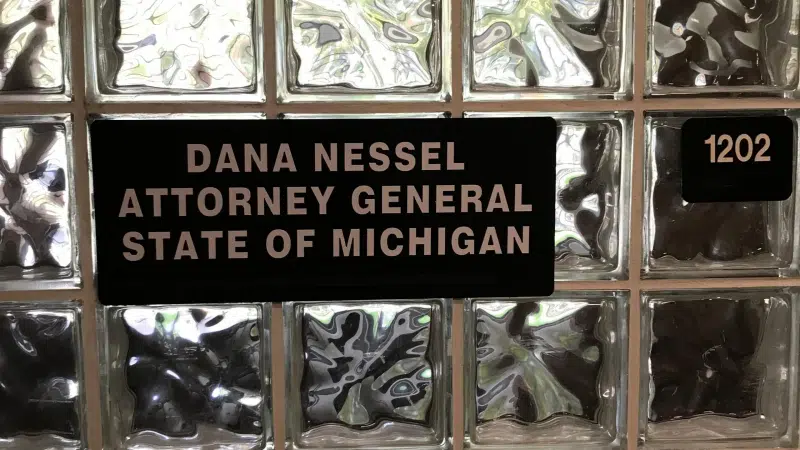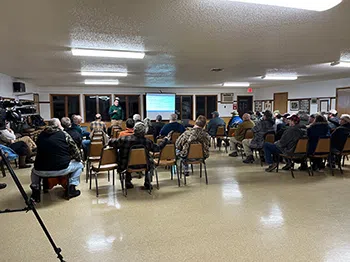President Biden signed the annual national defense bill into law today, which U.S. Senator Gary Peters (D-MI), a former Lieutenant Commander in the U.S. Navy Reserve and member of the Senate Armed Services Committee, played a key role in passing out of the Senate. Peters successfully led or supported provisions in the law to invest in Michigan’s military facilities, strengthen our national security, bolster troop preparedness, combat PFAS contamination and give our servicemembers a pay raise.
“These critical investments will not only support Michigan’s defense sector but the men and women in uniform across our state who play a key role in our national defense. From efforts to combat PFAS contamination – to ensuring our troops are well-prepared – to bolstering Michigan’s military installations – this law takes important steps to have the backs of those who selflessly serve our nation,” said Senator Peters, a former Lieutenant Commander in the U.S. Navy Reserve and member of the Senate Armed Services Committee. “This national defense law will also provide our troops a well-deserved pay raise and strengthen our national security.”
“Senator Peters continues to be a champion for the Michigan National Guard who fights to ensure our Soldiers and Airmen have the federal support they need to perform their mission,” said Major General Paul D. Rogers, Adjutant General and Director of the Michigan Department of Military and Veterans Affairs. “This year’s NDAA contains many wins for Michigan that will keep our installations and facilities at the forefront of Department of Defense training and ensure Michigan remains a vital enabler of our National Defense Strategy.”
The National Defense Authorization Act sets annual policy for the Department of Defense (DOD). The defense bill has been signed into law for more than 60 straight years.
The following provisions Peters led or supported, including the authorization of more than $40 million in funding for Michigan’s military facilities, were secured in the law:
Investing in Michigan Military Facilities:
- $1.6 Million for Army Reserve Center at Southfield: Peters included an authorization of $1.6 million to complete the construction of maintenance facilities at the Army Reserve Center in Southfield. This builds on Peters’ efforts in last year’s national defense bill to secure a $12 million authorization to help construct new maintenance facilities at the Army Reserve unit in Southfield, which allows servicemembers who serve as mechanics to maintain and extend the lifespan of military vehicles and enable them to utilize the latest equipment and facilities
- $16 Million for National Guard Armory at Camp Grayling: Peters secured an authorization of $16 million for a National Guard armory at Camp Grayling. This funding authorization aligns with the President’s budget calling for funding the armory and helps ensure the Armory can receive full appropriations. This follows Peters’ efforts in last year’s national defense bill to secure the authorization of $5.7 million for the construction of a power generation system.
- $24 Million for Marine Corps Reserve Unit at Battle Creek: Peters included an authorization of $24 million for new supply and storage facilities for the Marine Corps Reserve Unit in Battle Creek. This builds on Peters’ efforts in last year’s national defense bill to secure the authorization of $10 million to construct a new main gate and entrance facility to Battle Creek Air National Guard Base.
Addressing PFAS Contamination:
- Tackling PFAS Contamination: Peters has led the charge in the Senate addressing PFAS contamination. The national defense law includes a Peters-led effort that will bolster the Department of Defense’s (DoD) transparency surrounding PFAS research to keep servicemembers and communities safer. It asks DoD to establish practices to ensure the timely and complete dissemination of research findings and data relating to PFAS to the general public. It will also specifically ask DoD to release to the public within 180 days up-to-date information on any research collaborations, the development and testing of fluorine-free firefighting foam, PFAS health effects and the impacts on veterans and military families, and treatment options for drinking water and safe PFAS disposal. Peters also supported provisions to phase out the military purchase of firefighting equipment containing PFAS and authorize significant funding to clean up PFAS contaminated military sites.
Supporting Michigan’s Defense Sector and Advanced Technology:
- Funding Electrification Technology for Army Vehicles: Peters secured a $5 million authorization to help fund the continued development of Next Generation Electrified Transmission, as well as a provision encouraging continued Army funding towards the project to reduce fossil fuel reliance and meet climate strategy goals. This funding will ensure that vital work to develop next-generation, hybrid engines can continue being done in Michigan.
- Ensuring Appropriate Use and Recycling of Federal Electric Vehicle Batteries: The bipartisan law includes a provision, based on Peters’ Strategic EV Management Act, that will ensure government agencies are properly using and recycling batteries from the federal fleet of electric vehicles (EVs). The provision will help the federal government provide American manufacturers with a domestic supply of reusable EV batteries and the rare metals needed to make them, while reducing our nation’s dependence on foreign suppliers for these limited, but critical resources.
- Support for Ground Combat Vehicles: Peters supported an increase in authorization of funding for ground combat vehicles – including the Abrams tanks, Stryker vehicle upgrades, and Paladin Integrated Management (PIM) systems. General Dynamics Land Systems in Sterling Heights is the prime contractor for the Stryker armored vehicle and many Michigan companies serve as suppliers for each of these platforms.
- Bolstering Cybersecurity Efforts: Peters supported a provision to establish the DoD Cyber and Digital Service Academy as a scholarship-for-service program partnered with universities and colleges in the United States, with a DOD service requirement for participants. As Chairman of the Senate Homeland Security and Governmental Affairs Committee, Peters is leading the charge to strengthen our cybersecurity and has passed into law significant cybersecurity reforms.
- Ensuring Agencies Can Quickly Adopt Cloud-Based Technology: Peters secured a provision, based on his bipartisan bill, to ensure federal agencies are able to quickly adopt cloud-based technologies that improve government operations and efficiently provide services to Americans. The provision will also make sure federal cloud systems – which store a considerable amount of personal and sensitive information – are secure from cyber-attacks.
- Securing and Preventing Misuse of Data Collected By Artificial Intelligence: The package includes a provision, based on bipartisan legislation authored by Peters, that will ensure that government contractors are securing and using data collected by artificial intelligence technology, such as biometric data from facial recognition scans, in a way that protects protect national security and in ensures the privacy and rights of all Americans.
Supporting Our Troops, Their Families, and Their Communities:
- Pay Raise for Troops: Peters supported a 4.6 percent pay raise for both military servicemembers and the DoD civilian workforce.
- Supporting Troop Preparedness: Peters secured a provision highlighting the importance of cold weather training and mandating that DoD provide a report detailing existing all-domain warfighting centers that are able to support arctic like training exercises. Also included was a provision supported by Peters that authorizes $32.5 million in funding for female/small stature body armor.
- Promoting STEM Education through STARBASE: Peters supported efforts to authorize significant funding for STARBASE, a DoD Youth Program that promotes STEM education. Selfridge Air National Guard Base in Harrison Township is home to the first STARBASE program, which specifically provides K-12 students unique experiences in experiential learning, simulations and experiments in aviation and space-related fields.
- Supporting Defense Community Infrastructure Projects: Peters secured language altering the requirement for the Defense Community Infrastructure Program (DCIP) by allowing for land which is community owned but DoD leased to be eligible for DCIP project funding – allowing for the possibility of communities near Selfridge Air National Guard Base to apply for DCIP funds. Historically, DCIP projects have been used to improve access to and from military facilities, build more resilient infrastructure, enhance quality of life among servicemembers and their families, and bridge the gap between defense installations and the communities they serve.
- Safeguarding Houses of Worship: Peters helped secure a provision to reauthorize the Nonprofit Security Grant Program at $360 million. Peters has long championed and supported increased funding for this program, which provides grants to help houses of worship and at-risk nonprofits plan for and safeguard their facilities against potential attacks.
Invest in Defense Operations and Support U.S. Security Interests:
- Supporting Ukraine and Key Allies: The law extends and modifies the Ukraine Security Assistance Initiative (USAI), which provides appropriate security assistance to the Government of Ukraine and to other forces or groups recognized by, and under the authority of, the Government of Ukraine; and authorizes funding to provide security assistance to Ukraine via this authority.
- Supporting Counter Unmanned Aerial Systems (UAS) Research: Peters supported provisions to reauthorize cooperation between the U.S. and Israel on counter-unmanned aerial systems issues. This builds on Peters’ efforts in the previous national defense bill, which authorized a program for joint research and development with Israel on counter-unmanned aerial systems technology. A range of unmanned aerial systems from small, commercially available platforms to larger, armed aircraft pose a threat to both the United States and Israel. This cooperative research program will allow the United States military to benefit from Israel’s expertise and experience in countering unmanned aerial systems.
- Supporting Defense Relationship Between U.S. and Israel: Peters included a provision to clarify the requirements and expectations from Congress for the U.S. Israel Operations Technology Working Group. Peters previously called for the formation of the working group with the Israeli government to focus on shared defense technology issues and coordinate defense capabilities, research and development.
- Supporting Taiwan: Peters supported the authorization of the Taiwan Enhanced Resilience Act of 2022, including various provisions designed to increase security cooperation with Taiwan consistent with the Taiwan Relations Act, which will help deter aggression from the Chinese government.
- Building Information Operations: Peters included a requirement for the DoD to better identify and build up partner nation capacity to conduct information operations.
Investing in the U.S. Coast Guard:
- U.S. Coast Guard Great Lakes Center of Expertise: The bill authorizes additional funding for the operation of the U.S. Coast Guard Great Lakes Center of Expertise for Oil Spill Preparedness and Response. In 2018, Peters authored a provision that was signed into law to establish the Great Lakes Center of Expertise to examine the impacts of oil spills in freshwater environments and help develop effective responses. Peters later secured $4.5 million for the Center of Expertise, and led efforts to ensure it was headquartered in Michigan. Peters helped cut the ribbon at the Center of Expertise at Lake Superior State University’s Center for Freshwater Research and Education.
- Improve U.S. Coast Guard Data on Oil Spill Modeling: The law incorporates a recommendation from the National Academies of Sciences, Engineering, and Medicine to ensure the National Oceanic and Atmospheric Administration (NOAA) acquires all data relevant to advanced predictive modeling for spills of diluted bitumen being transported by pipelines. NOAA has begun incorporating new data on this practice; however, they are not required by law to do so. Therefore, this commonsense provision authored by Peters will require U.S. Coast Guard (USCG) to acquire this data to improve oil spill preparedness moving forward.
- Authorize Funding for New Great Lakes Icebreaker: The bill provides an authorization of $350 million in funding to acquire an additional Great Lakes icebreaker.
- Address Backlog of USCG Infrastructure Projects: The bill will begin to address the current backlog of USCG infrastructure projects in the Great Lakes by requiring an annual report from USCG on shoreside infrastructure needs by region.
Modernizing Water Infrastructure:
- Water Resources Development Act: The bipartisan Water Resources Development Act is included in the national defense bill. Peters helped secure major water infrastructure investments – including the authorization of projects through the U.S. Army Corps of Engineers to modernize the Soo Locks, stop invasive carp, prevent coastal erosion and flooding, and improve water quality in Michigan, among other priorities.
Other Provisions:
- Bolstering Federal Response to Disasters and Emergencies: Peters also helped secure provisions to strengthen our federal government’s response to natural disasters and emergencies. One bipartisan provision, based on legislation Peters helped introduce this summer, will ensure our nation is better prepared for high-consequence events, regardless of the low probability, such as new strains of disease, biotechnology accidents, or naturally occurring risks such as super volcanoes or solar flares that though unlikely, would be exceptionally lethal if they occurred. Peters also secured a provision that will expand mental health assistance for communities recovering from the psychological effects of natural disasters and other emergencies.
- Strengthening Protections for Inspectors General: As Chair of the Homeland Security and Governmental Affairs Committee, Peters has long worked to ensure government works effectively and efficiently. Peters secured long overdue reforms, based on legislation he championed in the Senate, to strengthen protections for inspectors general who conduct independent oversight to prevent and uncover fraud, waste, and abuse of tax dollars in the federal government.


























Comments